The Czech-Taiwanese Business Chamber team sat down with Jonáš Vlk, the Chief Commercial Office at Spaceknow, a provider of space-based imaging technologies. Spaceknow has recently expanded into the Taiwan market, partnering with aerospace provider Air Asia. In this interview, Vlk discusses Spaceknow’s experience in Taiwan, its unique offerings, market differences, and the similarities between the Czech Republic and Taiwan.
What factors have influenced your decision to expand into the Taiwanese market?
We have to start by acknowledging the exceptionally robust current political and economic relations between the Czech Republic and Taiwan. The relationship that the respective political establishments have built has added to an already strong connection between the two countries. When it comes to our expansion into Taiwan, we were looking to expand into like-minded countries, and as a progressive country that is capable technologically, Taiwan was a natural fit due to our shared values.
Have you identified any specific challenges or opportunities unique to the aerospace industry in Taiwan?
There is lots of opportunity in Taiwan, especially based on Spaceknow’s positioning as a unique product in the market thanks to our complex, state-of-the-art solution. We see Taiwan as an opportunity to nurture new partnerships and find new opportunities within the wider Asia Pacific. We feel lucky to have a strong partnership with Air Asia, which has allowed us to better understand the market and make connections. We anticipate opportunities in the UAV market, such as algorithm development to enable real-time analysis of UAV data. We also believe our Spaceknow Guardian product will add value in viewing military bases in China to anticipate potential changes in readiness.
How do you perceive the competitive landscape in Taiwan, and what sets your company apart?
We have found that Spaceknow doesn’t have any direct competition in the Taiwanese market due to the unique offering of our products. We have encountered companies that are using AI-driven algorithms to analyze satellite imagery but are using this for commercial or other purposes such as agriculture. Our partnership with Air Asia is very important for us as they are the right partner with the right capabilities. We strongly complement Air Asia’s offerings and are able to further integrate their products and services.
Can you share examples of successful expansions into other international markets and the key lessons learned?
We are now on multiple continents and regions with our product. We focus on clients in NATO countries and adjust our product based on the client’s needs and market requirements. Now that we are moving into Asia, we perceive that there are multiple countries that we can collaborate with. As a customer-oriented company with strong customer support and services, we believe we have a unique value offering, especially when the product reflects current market and partner requirements.
How do you plan to transfer the knowledge and best practices gained from your previous international experiences to Taiwan's expansion?
We strongly believe in transferring lessons learned from all of our partnerships into general product improvements. While we came to Taiwan with a specific product, we recognize that the operational needs of new clients differ from previous clients. We are still learning about the needs of clients in Taiwan and Asia. We want to offer a product that is focused on Taiwan’s needs and requirements, particularly in the very specific context Taiwan is in.
Have you considered any localization strategies to align with Taiwanese regulations or cultural nuances?
So far, Spaceknow has comfortably adjusted to Taiwan’s regulatory environment. Culturally, we feel that our cultures share similar values and views. Doing business with Taiwanese people and firms has been a pleasure, and we have felt a great deal of hospitality. We are really happy every time we go to Taiwan and work with our Taiwanese partners. One cultural difference is that in Europe, we tend to be a bit too pushy and rush things, whereas in Taiwan, we have learned to go with the flow a little more.
What strategies do you have in place to establish strong relationships with key stakeholders in the Taiwanese aerospace industry?
We have to thank Czech state support and the Czech-Taiwanese Business Chamber for helping us access stakeholders in Taiwan and find the right partners, such as Air Asia. We also feel the advantage from the political and business ties being nurtured at the moment. Working with Air Asia has been flawless. Our collaboration has also enabled Spaceknow to establish and nurture ties with other prospective partners while receiving strategic advice specific to the Taiwan market.
Are there any cultural differences that you are facing and need to deal with?
One thing is that Taiwan is not a very big country, so everyone knows everyone. It takes a long time to establish a sufficient level of trust. It can also take time to gain insights into the right stakeholders to connect with and how things work in specific companies or industries.
About SpaceKnow
SpaceKnow empowers decision-makers with ultra-large-scale planetary analysis. Our secret? A proprietary, AI-powered analytics engine combined with the world’s most comprehensive collection of earth observation imagery. The company is headquartered in New York City with a branch office in Prague.

